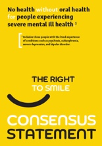March 20, 2022
Posted by:
IEPA
By David Shiers*, Gordon Johnston** and Vishal Aggarwal***
David Shiers, Gordon Johnston and Vishal Aggarwal call for services, researchers and policymakers to embrace The Right To Smile – a new consensus to tackle this serious and neglected health disparity. The right to equal treatment for this vulnerable population’s oral health should be respected and considered from the onset of psychosis.

The Challenge:
People experiencing psychosis, compared to those without mental ill health, are:
– More likely to have decayed, missing and filled teeth
– More likely to lose all their teeth
– More likely to experience gum and supporting bone problems
– More likely to develop oral cancer
– At greater risk of acute non-psychiatric hospital admission due to tooth decay
– Less likely to access dental services
– Less likely to brush their teeth
Nor is poor oral health just experienced as painful tooth decay, inflamed gums, tooth loss or oral cancer. Feeling ashamed to open your mouth because of bad breath or revealing unsightly teeth affect how you feel about yourself. Not having the confidence to talk, to laugh, to smile, to be close to others – little wonder the quality of peoples’ lives plummets as relationships become constrained and functions as basic as talking and eating are damaged. Poor oral health interacts with mental health and a vicious cycle ensues.
A forgotten health inequality:
There is growing interest in the importance of protecting the physical health of people with psychosis. However, while welcome targets and strategies exist to tackle health inequalities for cardiovascular disease and diabetes, oral health remains largely ignored. Research too has largely ignored the need to improve outcomes for oral health of this vulnerable group. We need more understanding of which interventions work best, particularly in the early phase of psychosis; yet only one study to date has investigated this – The Three Shires study which found that monitoring alone may be insufficient to change oral health outcomes. (Adams et al., 2018)
An Ounce of Prevention worth a Pound of Cure:
Dental diseases like tooth decay, gum disease and oral cancer are preventable if good oral self-care behaviours are implemented at the outset. These include regular toothbrushing with a fluoride toothpaste, reducing frequency of sugar intake, cessation of smoking, and limiting alcohol intake. We therefore need to shift our focus from ‘downstream’ treatments that commonly involve extraction of teeth and are offered in crisis for advanced tooth decay and gum disease, to ‘upstream’ prevention and early intervention when a diagnosis of psychosis is first established.
A Whole Team Approach Right From the Start:
the importance of supporting the physical health needs of people experiencing psychosis is now accepted. However, The Right to Smile asserts a ‘whole-person’ approach where there can be no health without oral health. To achieve its goals and targets requires ‘a whole team approach’ that prioritises oral health from the onset of psychosis:
- The patient and their close supporters (eg family) must be actively engaged at the centre of the team in discussions about oral health
- The mental health practitioner and team responsible for early diagnosis and treatment should consider oral health needs from the outset
- The dental professional must be:a) responsible for ensuring optimal oral health but also alert to possible psychosis in individuals attending with unusual dental presentations.b) aware that people with psychosis are a high-risk group for poor oral health including oral cancer
- The commissioner– must prioritise dental access for people with psychosis as a vulnerable group, for instance ensuring the availability of free or subsidised care.
The Right To Smile: Making a Difference From the Start
It’s time to raise expectations from those using mental health services to receive higher standards of oral healthcare. If we equip people with the right knowledge and skills, while supporting the adoption of healthy routines including regular dental check-ups before things go wrong, we can make a real difference to an individual’s health and their well-being.
Download The Right To Smile consensus bit.ly/42NcBM3
*David Shiers – Carer and Former Joint National Lead for Early Intervention in Psychosis Development Programme (2004-10).
**Gordon Johnston – peer researcher and independent consultant with lived experience of bipolar
***Vishal Aggarwal – Clinical Academic Dentist, currently Clinical Associate Professor in Acute dental care and chronic pain at University of Leeds Dental School
**** The Right to Smile consensus statement was developed by an oral health group spanning experts with lived experience and colleagues from primary care, mental health, and dentistry, established by the Closing the Gap Network
Declaration of Interest:
DS is an expert advisor for the NICE Centre for Guidelines. The views expressed in this blog are the authors and not those of NICE
References:
Adams, C. E., Wells, N. C., Clifton, A., Jones, H., Simpson, J., Tosh, G., … & Aggarwal, V. R. 2018. Monitoring oral health of people in Early Intervention for Psychosis (EIP) teams: The extended Three Shires randomised trial. Int J Nurs Stud, 77, 106-114. https://pubmed.ncbi.nlm.nih.gov/29078109/
Kisely S, Baghaie H, Lalloo R, Siskind D, Johnson NW. A systematic review and meta-analysis of the association between poor oral health and severe mental illness. Psychosom Med. 2015 Jan;77(1):83-92. doi: 10.1097/PSY.0000000000000135. PMID: 25526527.
Laverty, L., & Harris, R. 2018. Can conditional health policies be justified? A policy analysis of the new NHS dental contract reforms. Soc Sci Med, 207, 46-54.
Turner E, Berry K, Aggarwal VR, Quinlivan L, Villanueva T, Palmier-Claus J. Oral health self-care behaviours in serious mental illness: A systematic review and meta-analysis. Acta Psychiatr Scand. 2022 Jan;145(1):29-41. doi: 10.1111/acps.13308.
Yang, M., Chen, P., He, M. X., Lu, M., Wang, H. M., Soares, J. C., & Zhang, X. Y. 2018. Poor oral health in patients with schizophrenia: A systematic review and meta-analysis. Schizophr Res
